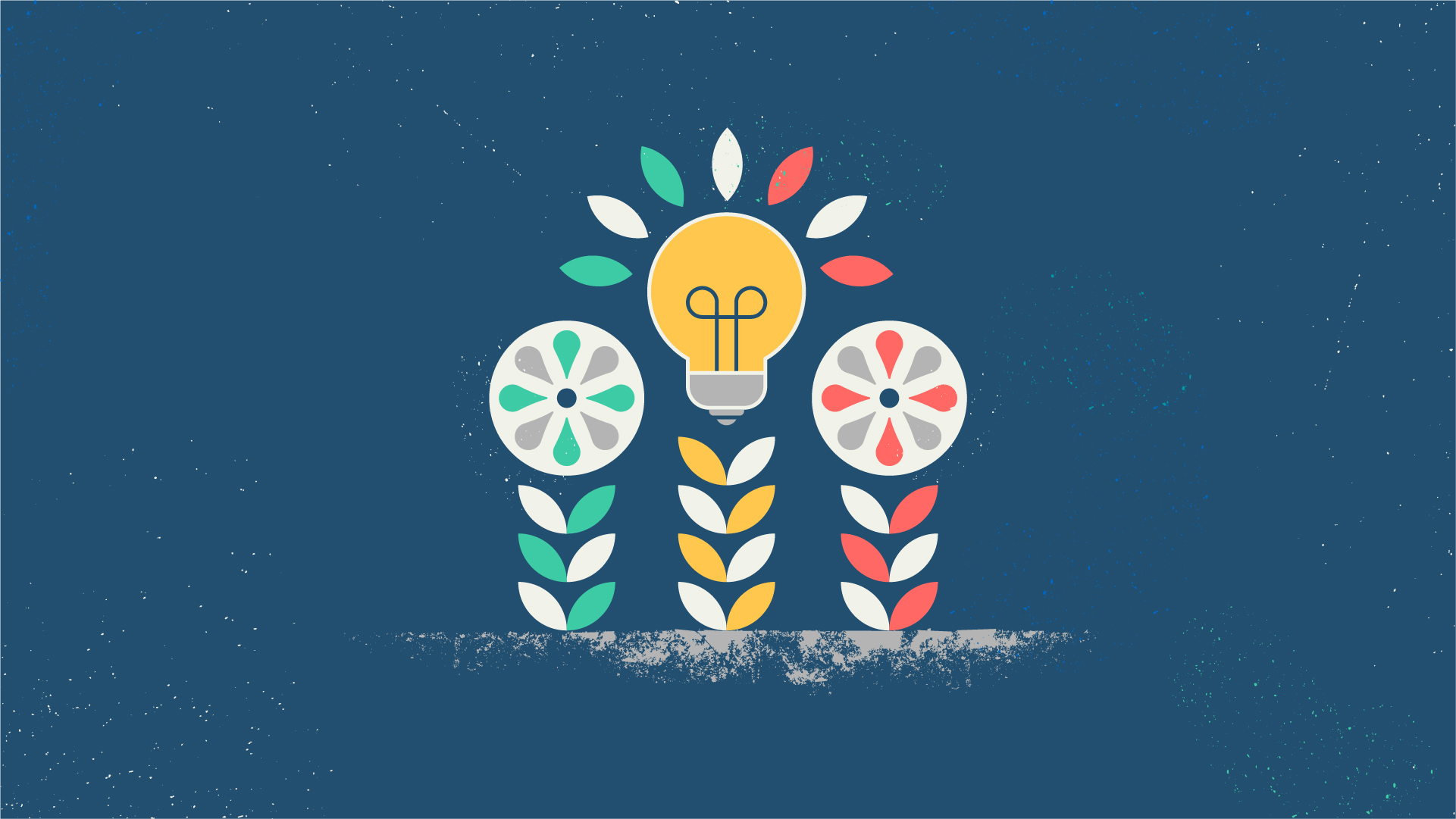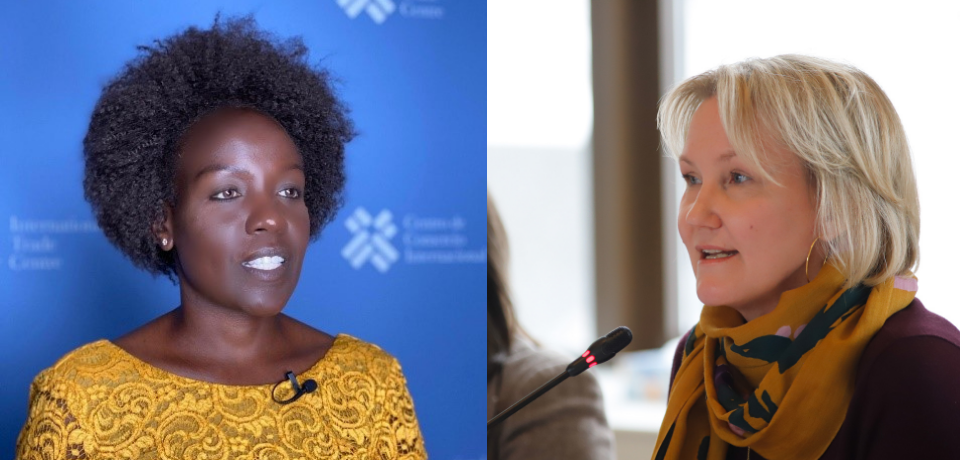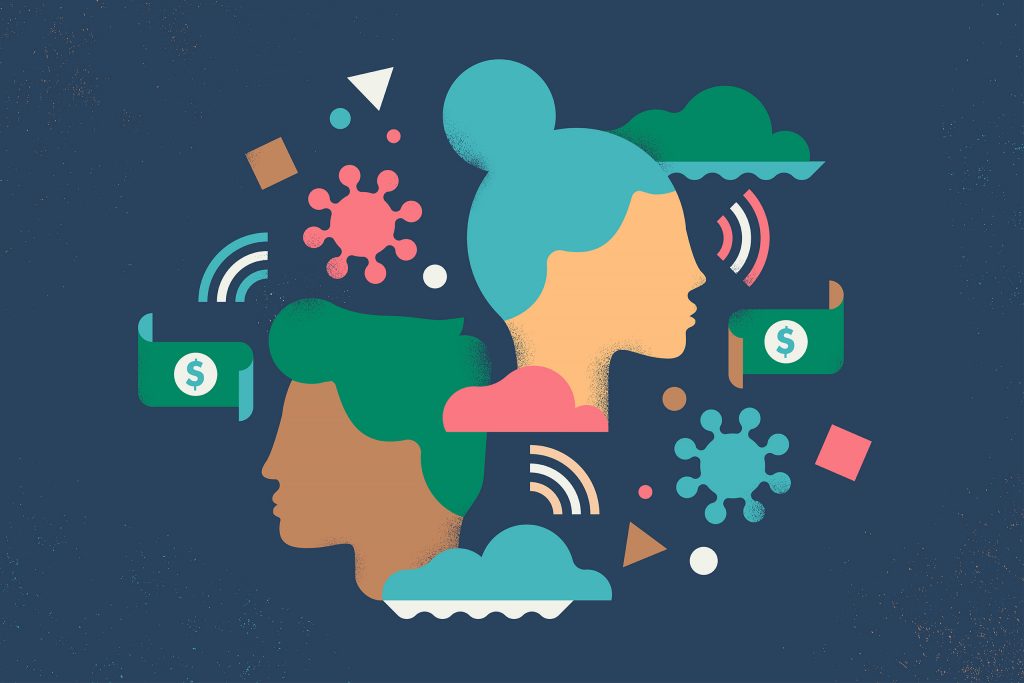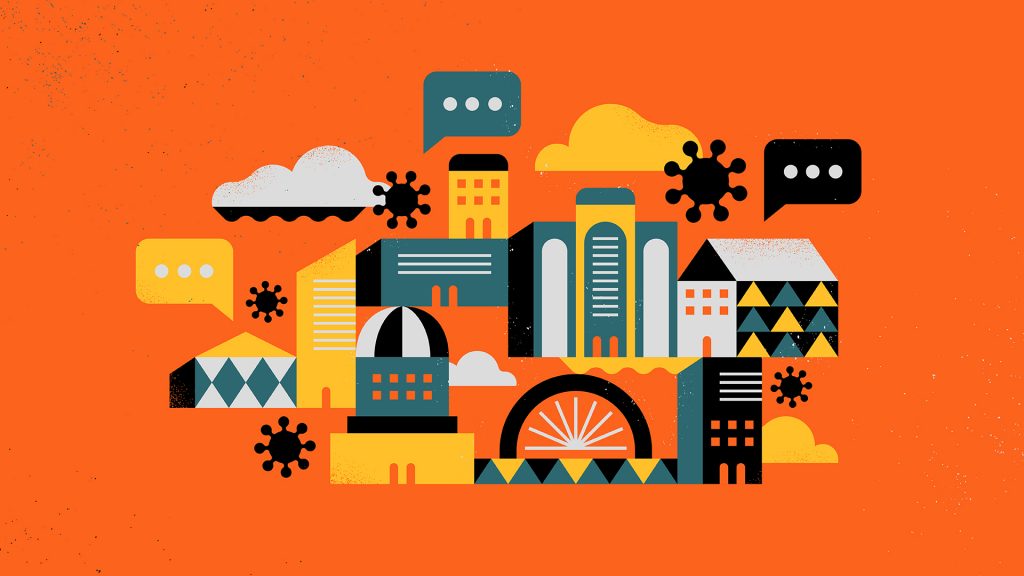Author: Alice Barbe
BiographyAlice Barbe
Alice Barbe is the co-founder and CEO of SINGA, a citizen movement which started in France but is now expanding across Europe. Founded in 2012, SINGA fosters collaboration between refugees and their host cities by focusing on refugee’s personal, professional, cultural, and entrepreneurial plans and goals. SINGA is a now active in 22 European cities and has worked with over 5,000 refugees and 20,000 locals. SINGA received a 2019 Global Pluralism Award honourable mention.

Illustration by Brandon Serbec
Alice Barbe is the co-founder and CEO of SINGA, a citizen movement which started in France but is now expanding across Europe. Founded in 2012, SINGA fosters collaboration between refugees and their host cities by focusing on refugee’s personal, professional, cultural, and entrepreneurial plans and goals. SINGA is a now active in 22 European cities and has worked with over 5,000 refugees and 20,000 locals. SINGA received a 2019 Global Pluralism Award honourable mention.
Alice was interviewed by Daniel Cervan-Gil, Manager of Programs for the Global Centre for Pluralism on June 1, 2020.
Alice reflects on how the pandemic has affected her organization’s work to build a more inclusive Europe that supports and respects newcomers. She shares examples of the creativity and resilience she has witnessed among the immigrants and refugees in her network.
The following is a transcript of the interview, which has been edited for brevity and clarity.
Daniel: What is the greatest challenge facing inclusion in Europe in the era of COVID-19?
Alice: The biggest question to me is, how can we unite in the face of what I see as the three major tsunamis of the 21st century: this pandemic, global warming and major data breaches, like the Cambridge Analytica scandal. These three giant waves of danger are threatening democracy, and they ignore borders. In a pandemic, it doesn’t matter whether you are, say, Syrian, French or German, you are all targets for the virus. We can close borders, but that is not going to change anything. It’s the same for global warming, and for big data. To me, it’s not really a question of borders or countries. It’s a question of coming together to find solutions in the face of these global challenges.
There was no public debate about immigration during the pandemic. However, we clearly thought about borders. There was a political war among leaders over which country had the best pandemic response. The old world came back, and that was scary. All the progress that had been made in terms of inclusion was simply gone. The mentality was: we are at war; we need to fight the pandemic. All solutions that could have come from the ground were simply ignored.
Consider the right to work for refugees who used to practice medicine in their home countries. These people could have contributed. In some countries they were allowed to work as doctors, but when we tried to do that in France, the response was simply, “Now is not the time to think about that.” There was no political leadership on this issue.
Meanwhile, immigrants have been on the frontlines of this pandemic. They are risking their lives and not being acknowledged. In the media, the narrative is that these newcomers are victims—and we can draw a parallel with the gender issue because we saw a huge rise in domestic violence—but no one was saying, hey, women and immigrants, more specifically immigrant women, are on the frontlines. They are the drivers, they are the nurses, they are the ones cleaning the streets. The people we call “vulnerable” are risking their lives every day to contribute and they are invisible.
Daniel: What does the future of inclusion look like, post-pandemic?
Alice: We have to find the best way to be united. Again, it doesn’t matter whether you are French or Somali when it comes to facing global challenges like a pandemic or global warming. Inclusion has to be about working on solutions against the major threats that we are all facing and being united to reduce inequalities.
The problem is that there is no way to convene and work together in an era of lockdown and physical distancing. But data shows that the more locals an immigrant knows, the more integrated he/she becomes—because when you have social capital, you have better access to housing, employment, love. At SINGA, we had about ten events per day when the lockdown happened, and that went down to zero in just a few days. This really challenged the way we work. How do we help people work together and engage in meaningful interactions if they’re not even able to meet?
Daniel: Can you tell me more about the challenges SINGA is facing during the pandemic and how you are adapting?
Alice: We are encountering a financial crisis right now, so we are losing resources that we were not expecting to lose. Meanwhile, we are having to pivot and ask, what are we going to do in this time of distancing? We tried online interactions, like Zoom lunches or yoga classes, but that was tricky. A lot of newcomers did not come to the Zoom meetings for many reasons: internet access, language issues, shame of being seen in a small apartment. Or, people were simply tired of being in front of their screens all day. So, we had to find new ways to engage people.
Very quickly, we launched Allomondo.org, an online matching platform between locals and newcomers so they could interact and challenge each other. We ask them about their dreams and concerns, what they would like to change about the world, and we match them up. We now have 500 people being matched and interacting over the phone or on Zoom in one-on-one conversations. During this time of emergency, people were looking for concrete and measurable solutions; they wanted to be helpful as well as to be helped. We found out that people were very enthusiastic about what we called “changing the world from home.” People mobilized around specific events and activities, such as rewriting the Geneva Convention, rethinking integration, reimagining everything. Many refugees reached out saying, “I escaped war. I can survive confinement. I know what it is like to live without friends and family, and I have solutions for getting through this.”
For example, my friend Carlos is an entrepreneur from Medellín, Colombia, who launched a coffee and honey harvesting business in Paris. In Medellín, you have all these invisible borders because of the drug cartels and the wars between narcos and gangs. Carlos said, “I grew up in a city where mi barrio was changing from one day to another, and the shops had to adapt.” You could lose all your customers within one day because one gang would have run over another one and you could not cross the borders without being killed or kidnapped. Carlos said, “This was my resilience story. It has taught me how to adapt with my businesses, with the food I’m producing and the people I’m hiring. I’m not afraid. I’ve been through worse, and I think it’s going to be alright.”
Daniel: That’s a powerful story. Do you have anything more to say about how newcomers are contributing to reshaping and offering a valuable perspective to European societies?
Alice: I have hundreds of stories about resilience and creativity. Another example is Firas, a Syrian entrepreneur who came to Germany. While travelling from Damascus to Berlin, he found out that his phone was not reliable. The battery was always dying and the device could not withstand high temperatures. When he arrived in Berlin, he thought, “I need to invent a new phone that never dies.” He used carbon technology to launch a phone that has been on the market since February. It’s called Carbon Mobile.
People on the move encounter challenges and have to find solutions on their own. I think this is how newcomers are reshaping our societies—not only making them more equitable, but also reshaping marketing, local economies, the way we eat, the way we think, the way we evolve. We only have to design the tools and provide the spaces for newcomers to enrich our society. If we continue to treat them only like victims, we will lose a lot of that talent.
Daniel: At SINGA, you have always been about giving access to tools and helping make connections so that great ideas see the light of day. How are you working now to empower newcomers to be a part of the solution in rebuilding after the pandemic?
Alice: When the pandemic occurred, we came together to ask, what can we do? We have a community of 50,000 extraordinary people. We know how to support entrepreneurship. We are connected to hundreds of entrepreneurs in many different countries, and these people have solutions that can be useful in the time of COVID.
Hundreds of newcomers reached out to share their resilience stories. We pledged to launch an Academy to highlight them and their resilience, and to mobilize 5,000 people before December to come up with 500 solutions to global challenges, under the scope of the United Nations Sustainable Development Goals. These people would identify challenges, shape their own solutions and be matched with someone, say in London or Montreal, who shares the same view. It’s about being more global in the way we work. From these 5,000 solutions, we are going to help prototype concrete projects, which we will incubate virtually through our online incubator.
I think this is the future. The more challenges like pandemics or global warming that we face, the more inequalities, the more need we’re going to have to harness communities into solutions. SINGA has always been about bringing people together, but I think today it’s about giving them the power and tools to act and to rethink every aspect of our society. It is about shifting the usual top-down approach and allowing people to be more creative and innovative in coming up with solutions. We have to reverse this narrative of, “This is the challenge. This is the solution. Please apply.” No, the solutions have to come from them so that we co-create our common future.




